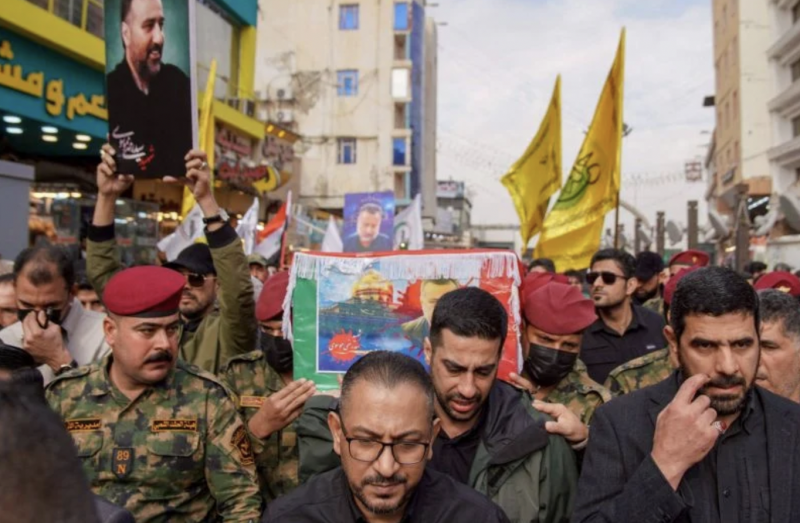
Honor guards carry the coffin of Razi Moussavi, a senior commander of the Islamic Revolutionary Guard Corps' al-Quds Force, killed on Dec. 25 in a strike blamed on Israel in Syria, during his funeral at the Imam Ali Shrine, in the Iraqi holy city of Najaf, Wednesday Dec. 27. (Credit: AFP)
Mehr News Agency, the semi-official Iranian news agency, quoted on Wednesday morning IRGC spokesman Ramezan Sharif that Hamas’s Oct. 7 bloody attack was “one of the acts of revenge for the assassination of General [Qassim] Soleimani,” the former head of Iran’s elite Quds Force, killed in a US strike in Baghdad in January 2020.
The press office of Hamas, the Islamic movement that is part of the “resistance axis,” immediately denied this statement.
“We deny the veracity of the statements made by the IRGC spokesman regarding al-Aqsa Flood Operation and its motives. We have already announced on several occasions the motives and reasons behind the al-Aqsa Flood Operation, underscoring in particular the dangers to the al-Aqsa Mosque [in Jerusalem],” said Hamas, which runs Gaza.
Volte-Face
Since Hamas’s attack on Israel, which killed nearly 1,200 Israelis, the extent of Tehran’s involvement in the al-Aqsa Flood Operation has been raised.
Although Iran has been providing financial, logistical and military aid to Hamas for years, several observers suggested that Hamas expected the “resistance axis” to fully join the “major plan” announced on Oct.7 and was therefore disappointed by its regional allies’ relative self-restraint.
Sharif’s remarks on Wednesday mark a U-turn in the rhetoric adopted by the Islamic Republic and its Lebanese proxy, Hezbollah. Three days after Hamas’s surprise offensive, Iran’s Supreme Leader Ayatollah Ali Khamenei said, “those who say that the recent saga is the work of non-Palestinians are mistaken.”
This is while Hezbollah’s Secretary General Hassan Nasrallah said in a speech Nov. 3 that “the whole operation was 100 percent Palestinian.”
These statements are contradicted by numerous elements revealed over the past two months which suggest that Iran played a role in the preparation of the Oct. 7 attack, without being aware of all its details. So, should the statement of the IRGC spokesman be taken seriously?
Iranian embarrassment
The timing of the remarks suggests that Tehran is sending a message to Israel to dissuade it from eliminating leading Iranian officials, and to urge it to return to the previous rules of engagement.
This statement came two days after the assassination of Razi Mousavi, who was described by the IRGC as “one of the most experienced advisers” of the al-Quds Force, in an air strike that Tehran attributed to Israel.
Killed after three missiles targeted his residence in Syria, Mousavi was in charge of the military coordination between the regional forces allied to the IRGC.
Israel — which did not claim responsibility for the strike — rarely targets prominent officials, focusing its attacks in Syria more on the infrastructure of Iran’s proxies. Mousavi is the highest-ranking figure of the “resistance axis” that Israel killed since the assassination of Imad Mughniyeh in a car bomb in Damascus in 2008. Since Monday’s raid, the IRGC has issued a series of warnings.
In a statement on Wednesday, IRGC spokesman warned Israel: “Our response to Moussavi's assassination will be a combination of direct action as well as [from] others led by the Axis of Resistance,” in a context marked by intensified attacks by Yemen’s Houthi rebels in the Red Sea.
Beyond the Iranian warnings, what response can we expect from Tehran? Is there a risk of regional escalation?
Several observers lately suggested that Hezbollah might act in retaliation for the Israeli strike, given that Mousavi was responsible for the transfer and transport of arms from Iran to Syria and Lebanon, as well as to Iraq, Yemen and the Palestinian territories, Al Jazeera reported.
But since the beginning of the Israel-Hamas war, Hezbollah has been keen to contain the conflict, limiting its acts to proportionate strikes against Israeli territory after opening the Lebanese front on Oct.8.
“Hezbollah never retaliated for the assassination of its own military commander, Imad Mughniyeh, let alone Qassim Soleimani. The idea that it would respond to the killing of an IRGC advisor, regardless of his important role in procuring weapons, would be quite exceptional,” wrote Amal Saad, a Lebanese political analyst focusing on Hezbollah, on X (formerly Twitter).
“When the balance of deterrence is upset by assassinations in times of war, deterrence can be restored within the context of the war. When the balance is shaken in the absence of hostilities, this usually calls for some kind of security tit-for-tat. The context now is war,” she added.
In a sign of embarrassment for Iran and its desire to calm things down after Hamas’s notorious and public denial, the IRGC spokesman retracted his statement in an interview with The New Arab on Wednesday.
Sharif justified himself by claiming that his remarks had been “misunderstood,” adding that the results of the al-Aqsa Flood Operation were “revenge" for the assassination of Soleimani.
This article was originally published in L'Orient-Le Jour. Translated by Joelle El Khoury.